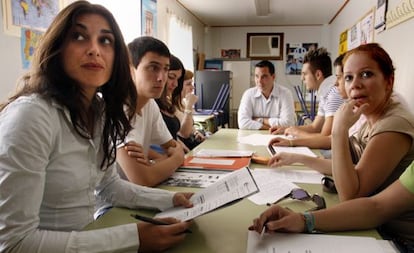High-school dropouts flock back to the classroom as crisis hits hard
Youth unemployment has shot up to 55 percent during the recession

"If I found a job, I'd quit right now," says Junior Japa, 18, speaking at the adult learning center in Inca in Mallorca. Standing next to him, 22-year-old María Cobos agrees: "You have to grab a job when you can, because who knows what will happen later."
Despite her words, María is one of thousands of young people who have returned to the classroom after the economic crisis raised her age group's jobless rate to 55 percent. Junior would have quit school years ago, but given the current circumstances, he would rather keep on studying.
Both reasons are behind a notable reduction in school dropout rates, which are at their lowest point on record: 24.9 percent, according to 2012 estimates by labor union CCOO, which used official figures.
Junior and María, who still have three years to go to get a high school diploma, show how fragile the figures are. Though 24.9 percent is considerably better than the 31.9 percent rate registered in 2008 before the crisis really hit, Spain is still among the worst performers in Europe, where the average dropout rate in 2011 was 13.5 percent. This number reflects how many 18 to 24-year-olds have stopped studying before getting at least a high school or vocational training diploma, which the European Commission says will be absolutely essential to finding a job by 2020.
If I found a job, I´d quit right now," says 18-year-old student Junior Japa.
The important thing is to ensure that kids get their diplomas and the skills that come with them, not to make the figures more palatable. The EU has set an average dropout target of 10 percent for 2020. For Spain, where the target is higher at 15 percent, economists say that getting youngsters to complete their studies is a crucial step toward abandoning the production model based on unqualified jobs in construction and services.
For now, dropout rates are descending more sharply among the younger population: for 18-year-olds it went down from 25.5 percent to 15.7 percent between 2008 and 2012, while the fall was more gradual among 24-year-olds, 34.3 percent to 31.2 percent, according to the CC OO study. This suggests that dropout rates will continue to dwindle if youngsters like Junior and María fail to find a job.
The Balearics was a paradigmatic case study. For years there were easy jobs to be had, while the school system was unable to hold students back. But under the impact of Spain's economic crisis, it is one of the regions with the greatest reduction in dropout rates (from 43.2 percent down to 30.1 percent), together with Murcia (41 percent to 27.7) and La Rioja (37.2 percent to 22.8).
You have to grab a job when you can, because who knows what´ll happen later"
In the Balearics, unemployment among the young is 42.84 percent. Meanwhile, admissions to high school courses for adults have tripled since 2008, while mid-level vocational training enrollment has shot up nearly 70 percent. At the national level, admissions to adult learning centers have grown around 41 percent for seekers of high school diplomas and 35 percent for mid-level vocational training.
"Just as there is no one single cause for dropping out of school, there is no single reason for going back," says José Manuel Patricio Martín, director of the Adult Education Center Borja Moll in Inca. This is one of the most industrial municipalities in Mallorca, a place whose economy is based on footwear manufacturing and seasonal work in the tourism industry. There has been a 30-percent increase in the student body at the adult education center, although it could be even higher.
"We have the facilities and the demand, but we lack the personnel," says Martín.
In the last two years, the Borja Moll center has lost eight teachers, and is now down to 26. Public schools across the Balearics are feeling the effects of spending cuts, just like other regions: the islands' education budget has gone down 7.9 percent since 2010.
The paradox is that the crisis is finally pushing people back to the classrooms, but also as a result schools have significantly fewer resources to deal with the influx. Since 2010, public budgets for schools and universities have lost over 6.3 billion euros, and the government's aim is to cut as much as 10 billion by 2015.
Due to the crisis, schools have fewer resources and higher enrollment
Some people point to other reasons for the better statistics. "Perhaps there has been a change in family attitudes regarding the importance of education," suggests Antoni Quintana, president of the association of high school principals of the Balearics. Then again, it could be that the experts are right and that dropout rates have retreated more sharply in places where they were the highest to begin with.
"Spain is one of the countries where a reduction in dropout rates is mainly due to a change in economic cycles and not to a change in education policies," says Kristof De Witte, an economist at Louvain University in Belgium. Spanish Education Minister José Ignacio Wert insists that Spain's problem has nothing to do with resources but rather with structure, and that his reforms will turn around consistently mediocre national results in the OECD's PISA education report, not to mention improve dropout rates. This will be achieved by simplifying the school curriculum and creating earlier, more flexible access to vocational training, he claims.
Critics contend that the reform will only make things worse by placing more hurdles in students' way, such as final examinations at the end of high school. CCOO rejects the reforms and finds a direct link between spending cuts in education and dropout rates that are no longer falling as much as they had recently. Union experts figure that the problem could be addressed with a five-billion-euro investment over the next four years to create specific programs for school dropouts.
Jesús, 18, flunked the third year of high school and took it again before then deciding to apply for mid-level vocational training. He passed the entrance examination and enrolled in a course called industrial maintenance. But he quit after a while. "It seemed very hard," he explains.
Since 2010, budgets for education have been cut by 6.3 billion euros
Manuel Madaula, 23, says he had to quit school at aged 16 as his family needed the extra income. He started working at a biscuit factory in Inca where his father still works. Two years ago, the company fired seven or eight people, Manuel among them. "I looked around, but I knew that without a high school diploma I wouldn't find anything." So last year, he signed up at the Inca adult education center, and hopes to graduate this year.
Asked whether he worries that dropout rates will rise again when there are more jobs to be found in Spain, Onofre Ferrer, director general of academic planning at the Balearic government, replies: "Actually, that would almost be a desirable problem."
Tu suscripción se está usando en otro dispositivo
¿Quieres añadir otro usuario a tu suscripción?
Si continúas leyendo en este dispositivo, no se podrá leer en el otro.
FlechaTu suscripción se está usando en otro dispositivo y solo puedes acceder a EL PAÍS desde un dispositivo a la vez.
Si quieres compartir tu cuenta, cambia tu suscripción a la modalidad Premium, así podrás añadir otro usuario. Cada uno accederá con su propia cuenta de email, lo que os permitirá personalizar vuestra experiencia en EL PAÍS.
¿Tienes una suscripción de empresa? Accede aquí para contratar más cuentas.
En el caso de no saber quién está usando tu cuenta, te recomendamos cambiar tu contraseña aquí.
Si decides continuar compartiendo tu cuenta, este mensaje se mostrará en tu dispositivo y en el de la otra persona que está usando tu cuenta de forma indefinida, afectando a tu experiencia de lectura. Puedes consultar aquí los términos y condiciones de la suscripción digital.









































